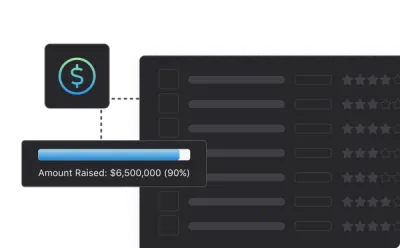
How to Find Venture Capital to Fund Your Startup: 5 Methods

Securing funding is one of the biggest challenges for any startup. Beyond building your product, hiring a team, and bringing your business to market, finding the right venture capital (VC) to fuel your growth is essential. For many startups, VC is a popular funding option, but the process of securing it can be complex and overwhelming.

If you're trying to figure out how to find venture capital or how to approach VC investors, you're not alone. Many founders struggle with finding the right investors, but with the right strategy, the process becomes much more manageable. In this guide, we’ll explore five proven methods that show you how to find the right VC investors and secure the funding your startup needs.
Whether you're just starting or actively seeking investment, this article will provide actionable tips to help you improve your chances of success.
Related Resource: How to Find Investors
What Kinds of Companies Are Venture Capital For?
Not every business is a perfect match for venture capital. VC investors typically look for startups that can grow rapidly in large markets and have the potential to generate significant returns. This is because venture capitalists are responsible for delivering strong financial results to their limited partners (LPs) by making high-risk, high-reward investments.
If your company operates in a niche or smaller market, or if your growth trajectory isn’t geared toward a potential massive exit, venture capital may not be the right path for you. VCs tend to favor startups in industries like technology, healthcare, and fintech—areas where scalability is built into the business model and the potential for a large exit is clear.
It's essential to understand this fit before investing time and energy into pursuing VC funding. Make sure your startup's goals and growth potential align with the expectations of venture capital investors before approaching them.

Related Resources: Understanding Power Law Curves to Better Your Chances of Raising Venture Capital
What is the Difference Between Venture Capital and Angel Investment?
Another option similar to venture capital is angel investors. Both generally operate as equity investors, but angel investors do not have the pressure to generate huge returns that a venture capital fund might feel.
As put by the team at Investopedia, “An angel investor is a high-net-worth individual who provides financial backing for small startups or entrepreneurs, typically in exchange for ownership equity in the company. Often, angel investors are found among an entrepreneur’s family and friends. The funds that angel investors provide may be a one-time investment to help the business get off the ground or an ongoing injection to support and carry the company through its difficult early stages.”
Related Resource: How To Find Private Investors For Startups
Methods for Finding Venture Capital
When it comes to securing venture capital funding, having a well-rounded approach is essential. There are multiple ways to connect with potential investors, and each method has its own advantages. Below, we explore five proven strategies to help you find the right venture capitalists for your startup, from online platforms to in-person networking.

1) Online platforms and investor databases like Visible Connect
If you determine that venture capital is right for your business, you’ll need a strategy to find and pitch the right investors for your business. We have found that the average founder speaks with 50-100 investors over the course of a fundraise.
In order to make sure you are spending time on the right investors, you need to have a clear understanding of the type of investor you are looking for. From here, you can build out a list and start reaching out and finding warm introductions. To find investors your for your startup, check out our free investor database, Visible Connect.
Related Resource: Building Your Ideal Investor Persona
Related Resource: Miami’s Venture Capital Scene: The 10 Best Firms
Related Resource: The Rise of Venture Capital in Utah: A Look at Utah’s Top 10 VC Firms
2) Venture Capital Associations
Different venture capital associations and firms can be a great way to get familiar with the eco-system and finding connections to potential investors. Check out a few popular VC associations below:
National Venture Capital Association (NVCA)
As written by the team at National Venture Capital Association, “NVCA unites the U.S. venture ecosystem to support the formation of high-growth companies and ensure the U.S. remains the most competitive environment in the world for entrepreneurs.” Learn more about NVCA here.
The Small Business Administration’s (SBA) Small Business Investment Company (SBIC) Program
As put by the team at The Small Business Administration, “Created in 1953, the U.S. Small Business Administration (SBA) continues to help small business owners and entrepreneurs pursue the American dream. SBA is the only cabinet-level federal agency fully dedicated to small business and provides counseling, capital, and contracting expertise as the nation’s only go-to resource and voice for small businesses.” Learn more about the SBA here.
Related resource: Business Venture vs Startup: Key Similarities and Differences
3) Online VC databases and lists
There are countless online VC databases and lists intended to help founders filter and find the right investors for their business. Over the course of a fundraise, it is crucial that you are spending time on the right investors for your business. With Visible Connect, our free investor database, you’ll be able to filter and find investors based on the properties that matter most to your business.
Related Resource: Exploring VCs by Check Size
Related Resource: Exploring the Top 10 Venture Capital Firms in New York City
Related Resource: Chicago’s Best Venture Capital Firms: A List of the Top 10 Firm
4) Social media platforms
Venture capitalists tend to be active on social media — like Twitter and LinkedIn. If you are unable to find a warm introduction to specific investors, social media can be a great place. By engaging with potential investors and introducing your business to them, you’ll be able to better your odds of finding an introduction or booking a meeting.
5) Networking – online and in-person
Investors are making a large bet when investing in a business. In order to build trust and move your fundraising along, you need to be constantly building and maintaining relationships. One of the best ways to do this is by leveraging online resource and in-person events to network. We find that sending a simple monthly update is a great way to help investors build conviction and trust in your business. Check out an example below:
Related Resource: Potential Investor Nurture Update Template

Building Relationships with Investors Before You Need Them
When it comes to securing venture capital, many founders focus solely on the fundraising process- finding the right VCs, pitching their business, and negotiating terms. However, one of the most powerful strategies is to start building relationships with potential investors well before you actually need to raise capital. Establishing rapport early on can significantly increase your chances of securing funding when the time comes.
Stay on Investors' Radar with Regular Updates
One of the best ways to nurture relationships with investors is by sending them regular updates about your company’s progress. Even if you’re not actively fundraising, keeping potential investors informed shows them that you’re executing on your business plan and making strides in your market. Monthly or quarterly updates can cover key milestones, growth metrics, new hires, or product developments.
Using a tool like Visible makes this process easier and more effective. With Visible, you can send beautiful, data-driven updates that provide investors with the insights they need to stay engaged. Visible also allows you to track who’s engaging with your updates, giving you valuable information about which investors are paying attention. This can be a game-changer when you’re ready to raise capital, as you’ll know which investors are most interested in your company.
Providing consistent, value-driven updates helps you stand out and build credibility among investors over time.
Seek Informal Advice
Another effective relationship-building strategy is to seek informal advice from investors. Investors appreciate founders who take the initiative to learn from their experience and expertise. By asking for input on specific aspects of your business- whether it’s product development, market expansion, or customer acquisition- you can create meaningful connections without the pressure of asking for capital.
Over time, these informal conversations can evolve into deeper relationships, and when you're ready to raise funds, investors who have been following your journey may be more inclined to participate. For example, with Visible, you can track these interactions and stay organized, allowing you to maintain personal touchpoints with investors who have provided feedback or advice. This positions you as a thoughtful and proactive founder- exactly the type of entrepreneur VCs want to back.
Invite Investors to Demo Days or Events
Inviting investors to key events such as demo days, product launches, or industry conferences is another way to build long-term relationships. These events give investors a chance to see your progress firsthand and get excited about your vision.
You can also set reminders to follow up with attendees after an event, ensuring that you maintain momentum and stay top-of-mind with investors. Keeping this line of communication open increases the likelihood that they’ll participate when you formally start raising capital.
Early Relationship-Building as a Key Strategy
By establishing relationships with investors early on, founders gain a significant head start when it comes time to raise capital. Not only do these relationships help build trust, but they also give you insight into what investors are looking for, which can shape how you run and grow your business.
Many successful founders credit early relationship-building as one of the reasons they were able to raise capital more efficiently. It’s easier to ask for an investment from someone who has already been following your company’s journey, rather than from a cold introduction.
Tips for Securing Venture Capital
As we mentioned above, making sure you are spending your time on the right investors is crucial to a successful fundraise. Check out a few tips for securing and finding the right investors below:
Find venture capital firms that invest in similar companies
First things first, you want to make sure you are pitching investors that invest in similar companies to yours. This means similar market, check size, and stage. You can filter by all of these fields in Visible Connect.
Know your business valuation
VCs are equity investors. Because of this, it is important that you have an understanding of your valuation and will be able to speak to it during your fundraise.
Related Resource: Valuing Startups: 10 Popular Methods
Ensure the VC firm matches the necessary funding stage
Venture capital spans many stages. Some investors will primarily invest in pre-seed or seed stages. On the flip side, some investors might solely focus on later stage investments. In order to make sure you are the making the most of your time, be sure that the investors you are targeting invest in your stage.
For example, if you are looking to raise a $1M seed round, you should not be pitching investors that write $20M+ checks.
Related Resource: The Understandable Guide to Startup Funding Stages
Examine the firm’s funding history
Another area to consider is a firm’s funding history. Venture capitalists typically raise 1 fund at a time. Generally, they will distribute this fund over 8-12 years. If you notice that a VC fund was last raised 8 years ago, it might be time to look for a fresher fund. This is because they might be more stringent with their investment criteria as they are reaching the last of their funds — the last capital could be reserved for current investments.
Related resource: Carried Interest in Venture Capital: What It Is and How It Works
Understand considerations for location
Some investors will only invest in specific locations and geographies. Most investors are very clear about this on their marketing site. Make sure you are paying attention to their investment criteria and fit the geographies they are investing in.

Common Fundraising Mistakes to Avoid
1. Over-Valuing Your Company
One of the most frequent mistakes founders make is over-valuing their company. While aiming for the highest valuation possible is tempting, doing so without strong justification can backfire. Investors are savvy and will closely evaluate your financials, market opportunity, and growth potential to determine whether your valuation aligns with reality. An inflated valuation can make it harder to attract investors and may cause you to face greater pressure during future funding rounds.
Instead, focus on a realistic and data-backed valuation that reflects your current traction, market conditions, and growth potential. Tools like Visible can help you track and share your financial metrics with investors, giving you a better understanding of your company’s true value and helping you avoid this common trap.
2. Approaching the Wrong Investors
Not all venture capital firms are the same, and one of the biggest fundraising mistakes is targeting the wrong investors. Every VC has different preferences when it comes to industries, stages of investment, and check sizes. Approaching investors who don’t align with your company’s sector, size, or growth stage can result in wasted time and missed opportunities.
Before reaching out, do your research. Use investor databases like Visible Connect to filter and find VCs that match your industry, geography, and funding stage. Focusing on investors who are more likely to be interested in your startup will improve your chances of making a meaningful connection.
3. Failing to Have a Clear Exit Strategy
Investors are ultimately looking for a return on their investment, and they want to understand how and when they’ll be able to realize that return. Failing to present a clear exit strategy- whether through acquisition, IPO, or another liquidity event- can make investors hesitant to commit to your company.
When pitching VCs, discuss potential exit scenarios and the timeline you foresee. This doesn’t mean you need to have every detail finalized, but demonstrating that you’ve thought through how investors will eventually see a return on their capital will give them confidence in your business plan.
4. Raising Capital Without a Strong Story
Venture capitalists are inundated with pitches, so having a compelling narrative around your business is crucial. Founders who focus only on the numbers and product without weaving those into a bigger story about the company’s vision, impact, and long-term growth potential can struggle to engage investors.
When crafting your pitch, make sure you’re telling a story that resonates with investors emotionally as well as financially. Highlight not just what your company does, but why it matters and how it’s going to change the market. Keep track of the milestones that make up this story, and ensure your updates to investors consistently reflect the progress toward achieving your vision.
5. Not Building Relationships Before Fundraising
Many founders make the mistake of only reaching out to investors when they’re actively fundraising. As mentioned in the previous section, building relationships with VCs before you need their money can make the formal fundraising process much smoother. Cold introductions during a fundraise are much less effective than pitching to investors already familiar with your business.
6. Lack of Preparedness for Due Diligence
Finally, another common mistake is not being fully prepared for the due diligence process once a VC shows interest. Investors will want to dive deep into your financials, customer data, legal structure, and more before committing. It can raise red flags and slow down or even end negotiations if you’re not organized or can’t quickly provide the necessary information.
The Role of Lead Investors in a VC Round
Securing a lead investor can be one of the most critical steps toward closing the deal in a venture capital round. A lead investor is typically the first and largest investor in the round and often plays a central role in negotiating the terms of the investment. Their involvement can influence other investors to join the round, making it essential to understand their importance and how they impact your fundraising efforts.
What Does a Lead Investor Do?
The lead investor not only commits a significant portion of the total funding in a round but also sets the terms for the deal, such as the company’s valuation, the amount of equity being offered, and the rights associated with the investment. These terms are then presented to other investors, who often follow the lead investor’s guidance when deciding whether to participate.
This is why securing a lead investor early in the fundraising process is so valuable. Having a reputable, experienced lead investor on board can validate your startup’s potential, making it easier to attract additional capital from other venture capitalists and angel investors.
The Importance of Identifying a Strong Lead Investor
A lead investor brings more than just capital- they often bring expertise, networks, and credibility to your startup. A strong lead investor can help shape your company’s growth strategy, provide mentorship, and open doors to new business opportunities. Additionally, their backing can instill confidence in other investors, who may feel more comfortable participating in the round once they see a well-respected investor leading the charge.
When seeking a lead investor, look for someone who understands your market and believes in your vision for the company. Their alignment with your mission will influence their level of involvement and support. Ideally, they should be someone who can offer strategic value beyond just financial backing, acting as a trusted advisor and champion for your startup.
How to Secure a Lead Investor
Securing a lead investor typically requires building a solid relationship early on. Lead investors must feel confident in your team, product, and market potential. They’ll want to see clear signs of traction and growth before they commit to leading your round. As discussed in previous sections, building these relationships over time- through regular updates and informal interactions- can make it easier to secure a lead investor when you're ready to raise funds.
The Ripple Effect of a Strong Lead Investor
Once a lead investor is on board, the likelihood of closing the round increases dramatically. Other investors follow the lead investor’s terms, and their participation signals that your company is a solid investment opportunity. This ripple effect can make filling out the round much quicker and smoother.
Lead investors often take an active role in the company’s development post-investment, helping shape major business decisions and providing guidance on future fundraising rounds. Their involvement is not just a short-term win for your startup but a long-term partnership that can help drive the company's success.

Secure Venture Capital Funding With Visible
At Visible, we like to compare a venture fundraise to a traditional B2B sales process. At the top of your funnel you are adding qualified investors. Moving them through your funnel with meetings, email updates, pitches, and other communications. And ideally, closing them at the bottom of your funnel as a new investor.
See how Visible can help you along every step of your fundraising funnel. Give VIsible a free try for 14 days here.



